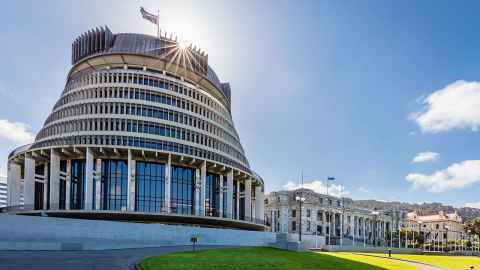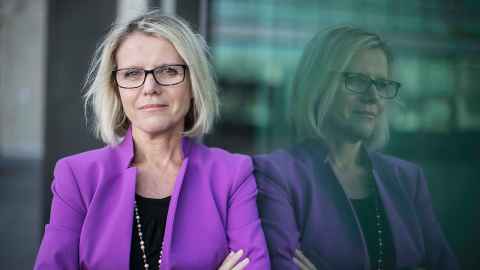The politics of the COVID-19 relief package
18 March 2020
Opinion: Jennifer Curtin analyses the government's recently announced $12.1 billion COVID-19 relief package in the light of an election year.

The government’s $12.1 billion package to alleviate the far-reaching effects of the COVID-19 pandemic is aimed at spreading funds across the economy to offer immediate relief to businesses, workers and beneficiaries, while also supporting the health sector during a time of immense pressure.
So it is unsurprising that we see $500 million going to health, and an immediate boost in funding for intensive care units. However, we are likely to see additional expenditure on health forthcoming in the May Budget, or earlier if pressures increase with community transmission.
Indeed, the largest proportion of the package was directed at alleviating the economic impacts of this crisis. Approximately $8 billion (two thirds) goes to the business sector in the form of tax changes to free up cash flow, and immediate wage subsidies in all sectors and regions, albeit based on a suite of criteria, which will favour small businesses primarily. There are other measures relating to worker redeployment and shoring up supply chains.
The remaining third (close to $3 billion) has been allocated to the most ‘vulnerable’. In practice, this amounts to a one year doubling of the Winter Energy Payment (paid to the elderly and beneficiaries) and a permanent increase of $25 per week to main benefits. Australian prime minister Scott Morrison has also offered additional payments to beneficiaries and low income earners as part of his government’s first stimulus package.
The increase in beneficiary payments makes economic sense for a number of reasons. First, those on low incomes are more likely to spend the increase, thus keeping consumption up. Second, in 2019, the Welfare Expert Advisory Group Report recommended increasing main benefits by between 12 and 47% to meet the increases in basic living costs. The government resisted this recommendation, and received much condemnation from advocacy groups who questioned whether it was committed to “kindness” in policy and reducing child poverty, both key election promises.
Political point scoring and adversarial politics may need to be put on the backburner for a short period to demonstrate that in a crisis, parliamentarians of all persuasions can work together in the national interest.
Third, we know that the elderly and those economically disadvantaged are more likely to contract the virus, and warm homes are important if self-isolation and social distancing become the norm. Finally, set dollar increases and universal payments are more efficient to administer, and the latter undermine the chance of resentment amongst voters as to how ‘need’ is determined. Others will analyse the financial implications of the package for the economy. Here, I explore what might result politically, given we are in an election year.
The Minister of Finance argues the economic and health impacts are inextricably linked. This is both pragmatic and politically sensible. Voters care about the economy and many, although not all, think about their own economic wellbeing when evaluating a government’s performance.
Analysis of New Zealand Election Study data shows a majority (perhaps as many as two thirds) of New Zealand voters are party identifiers, fans of a particular party to whom they will always be loyal, regardless of the government’s performance in this current crisis. But a significant minority, up to 40 percent, will be looking for reassurance that the Coalition government together with the Greens, can deliver leadership in this time of crisis.
Voting behaviour studies tell us that in periods of economic recession, we usually blame the government, while in times of economic prosperity, we reward it with our vote. Voters do not always agree on whether to save or spend money when a crisis hits.
For example we saw different responses globally to the GFC in 2008; some countries implemented stimulus packages while others focused on austerity. In the case of COVID-19, the disagreement between the parties seems to be more about where to spend rather than whether to spend. Rhetorically, Labour is linking its approach to that of the First Labour Government of Michael J. Savage who used public investment in infrastructure, increased wages and universalised benefits to stimulate economic recovery after the depression.
Voters then were unimpressed by the previous government’s harsh approach to policy. Thus, it will be important for the opposition not to appear ‘mean’ nor to frame their response in a way that demonises those who are receiving assistance. Instead, they could focus on the capacity of the government to manage the economic recovery, because we know from our NZ Election Studies that many voters see National as more likely to deliver good economic management.

It is also likely that the level of fear amongst voters will increase. For example, in times of economic downtown, people begin to fear for their jobs and their retirement savings. Add to this fear about health and unknown other ‘threats’ and it can become a toxic cocktail for parties to manage when campaigning.
Sometimes when there is an exogenous threat that requires government stability to overcome, voters may opt for the incumbent to shore up their sense of security. Here we can think of September 11 2001 – in Australia, the Labor Party opposition was gaining on the Howard government, but the terror attacks, and Howard’s handling of the need for a swift response, reassured voters.
In the current crisis, how party leaders talk about the issues and the policies that are being implemented will matter as much as the policies themselves. The government will need to continue to remind voters that this is a global crisis, while the opposition will need to focus their communication on the government’s domestic inadequacies.
Finally, the still-to-be-determined political dimension is the timing of the election. If social distancing continues, then voter turnout could be compromised. The recent French local government elections suggest as much. This is likely to mean more campaigning online, and an increase in advance voting and special voting by post, assuming there is no postponement.
Ultimately, however, voters are looking for leaders of all parties to be confident and sure in their efforts to secure our economic and social wellbeing. Political point scoring and adversarial politics may need to be put on the backburner for a short period to demonstrate that in a crisis, parliamentarians of all persuasions can work together in the national interest.
Professor Jennifer Curtin is a professor of politics and public policy in the Faculty of Arts, and the director of the Public Policy Institute.
This article reflects the opinion of the author and not necessarily the views of the University of Auckland.
Used with permission from Newsroom The politics of the COVID-19 relief package 18 March 2020.
Media contact
Julianne Evans | Media adviser
Mob: 027 562 5868
Email: julianne.evans@auckland.ac.nz